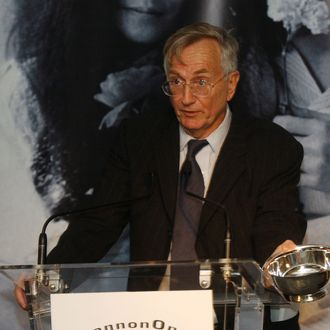London Review of Books Seymour Hersh Bin Laden
Why Seymour Hersh's 'Culling' bin Laden History Did Not Appear in The New Yorker

Photo: Brad Barket/Getty Images
Yesterday, the London Review of Books published i of the most mind-bending pieces of national-security journalism in recent memory: Seymour Hersh's alternative history of the Osama bin Laden assassination. Over more than than 10,000 words, the legendary investigative reporter and longtime New Yorker contributor un-spooled a remarkable narrative that accuses the Obama White House of concocting a "blatant lie" to hibernate Islamic republic of pakistan's involvement in the SEAL Team Six raid on bin Laden's compound in Abbottabad. "The White House'southward story might have been written by Lewis Carroll," Hersh writes. If Hersh'due south allegations show to be even somewhat truthful, the enormity of the cover-upward, not to mention the mainstream media's complicity in promoting it, would exist an enormousscandal.
Not surprisingly, the pushback has been ferocious. CNN 's Peter Bergen wrote that Hersh'due south piece "reads similar Frank Underwood fromHouse of Cards has made an unholy alliance with Carrie Mathison fromHomeland to produce a Pakistani version of Watergate." On CBS This Forenoon, quondam CIA deputy manager Michael Morell called information technology "all incorrect." On Twitter, Max Boot declared: "Sy Hersh is a far-left fantasist and conspiracy theorist who one time every few decades breaks real news." (Late Mon, NBC News published a story that backed up some of Hersh's reporting.)
One of the near interesting sub-dramas of Hersh'south exposé has to do with the commodity'southward appearance in the LRB . Why, many people are wondering, did Hersh's business relationship non announced in TheNew Yorker, where Hersh has been a contributor since 1971? In fact, the article's stunning claims put Hersh on the wrong side of his longtime journalistic dwelling. In August 2011, The New Yorker published a highly detailed recounting of the raid past staff writer Nicholas Schmidle that hewed closely to the Obama White Business firm's line. WasNew Yorker editor David Remnick's decision not to publish Hersh's piece a sign that Hersh's account couldn't be trusted? Or was it a sign, as some people are maxim, that Hersh's relationship with TheNew Yorker has soured over Hersh's sustained critique of the Obama national-security apparatus and Remnick's reluctance to challengeinformation technology?
When I spoke to Hersh before today, it was clear that there is tension. Hersh told me that he published the piece in the LRB because Remnick was not interested in having him write a magazine piece on the bin Laden raid. Hersh explained that, days afterward the May 2, 2011 SEAL functioning, he told Remnick that his intelligence sources were saying Obama'southward account was fiction. "I knew correct away that there were problems with the story," Hersh told me. "I just happen to have sources. I'm pitiful, but I do." Hersh told Remnick he wanted to write a slice for themag.
" David said, 'Do a blog,'" Hersh recalled. "I said, 'I don't want to do a weblog.' Information technology'southward well-nigh money. I become paid a lot more than writing a piece for TheNew Yorker [magazine] … I'thousand erstwhile and cranky." (Remnick declined tocomment).
Hersh, who is writing a book about the state of war on terror, decided to sell the bin Laden story to the LRB . "I like the politics of information technology better," he said. He said the slice was rigorously fact-checked. "TheLondon Review checks like theNew Yorker," he told me. (Though as New York book critic and former LRB editor Christian Lorentzen once wrote, the procedure tin be unlike beyond the swimming: "At the LRB we do bank check facts, which are for the near part conveniently located in the books we review … But nobody at the paper fact-checks full time; that's an Americanthing.")
I asked Hersh what he thought about Schmidle's account of the bin Laden mission. It was the 1 time in our conversation that he did not readilyrespond.
" Excuse me, I don't want to be a wise guy. Whatever I think of it … What am I supposed tosay?"
Hersh was quick to point out that his professional person relationship with The New Yorker hasn't inverse during the Obama years. He'due south never been a staff writer. "I've never been on a contract," Hersh said. "No one tin say I want you to do something. I'm too old and cranky and practice what I desire." And, he added, he published a feature in the magazine two months ago near his return to My Lai, the scene of the story that made himfamous.
Given that he knew he was challenging non just his longtime journalistic home, but also the established narrative of the biggest military mission in a generation, Hersh is not surprised past the criticism flying his way. And information technology'due south not the first time he's risked his reputation past making shockingclaims.
Hersh remains confident in his reporting. "I can tell you this: A belatedly draft was read past a lot of people on the within," he said, seeming to imply that multiple intelligence sources had signed off on his account. Still, in the end, he said, "It's onme."
Source: https://nymag.com/intelligencer/2015/05/sy-hersh-bin-laden-new-yorker-lrb.html
0 Response to "London Review of Books Seymour Hersh Bin Laden"
Post a Comment